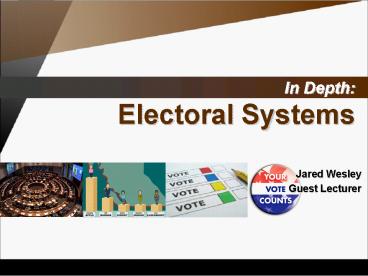In Depth: Electoral Systems - PowerPoint PPT Presentation
1 / 22
Title:
In Depth: Electoral Systems
Description:
What are the effects of electoral systems? consequences for democracy ... effective opposition (scrutiny) administration (expense & management) ... – PowerPoint PPT presentation
Number of Views:52
Avg rating:3.0/5.0
Title: In Depth: Electoral Systems
1
In DepthElectoral Systems
- Jared Wesley
- Guest Lecturer
2
Objectives
- How do electoral systems work?
- values mechanics
- What are the effects of electoral systems?
- consequences for democracy
- What are the politics of electoral reform?
- challenges opportunities
Lecture Notes home.cc.umanitoba.ca/wesley/teachi
ng
3
Electoral System Families
- Four (4) electoral system families
- Plurality systems
- Majoritarian systems
- Proportional systems
- Mixed systems
- Other electoral regulations
- compulsory voting, campaign finance,
- fixed election dates
4
Elements of Electoral Systems
- Elements of any electoral system
- electoral formula
- votes into seats
- threshold
- ballot structure
- ordinal/categorical
- single or multiple
- district size
- members per district
5
Values and Concerns
- Law Commission of Canada (2004)
- Representation
- Responsible Government
- Valuing Votes
6
Values and Concerns
- International I.D.E.A.
- geographic / territorial representation
- fairness (proportionality)
- demographic representation
- accessibility (ease of use)
- meaningfulness (votes influence outcome)
- effective legislature (pass laws)
- equality of voters (one-person-one-vote)_
- accountability (of representatives)
- consensus-building (reward broad appeal)
- stable government (mandate fulfillment)
- effective opposition (scrutiny)
- administration (expense management)
- ease of transition (familiarity)
7
Plurality Systems
- Single-member plurality (SMP)
- Block vote (BV)
- Single-nontransferable vote (SNTV)
- Two-round plurality (TRp)
- Advantages
- comprehensibility
- decisiveness
- accountability
- responsiveness
- Drawbacks
- disproportionality
- territory-based
- inclusiveness
- orphan voters
8
Majority Systems
- Two-round majority (TRm)
- Alternative vote (AV)
- Advantages
- comprehensibility
- decisiveness
- accountability
- moderation
- Drawbacks
- disproportionality
- territory-based (large)
- inclusiveness
- Condorcet losers
9
Proportional Representation (PR)
- List
- Single-transferable vote (STV)
- Advantages
- representativeness
- proportionality
- interparty cooperation
- voter efficacy
- Drawbacks
- party-based
- accountability?
- collusion
- deadlock
10
Mixed Systems
- Parallel Mixed
- Mixed-member-proportional (MMP)
- Advantages
- proportionality
- representativeness
- Drawbacks
- two-tier representatives
- party-controlled
11
The Politics of Electoral Reform
- British Columbia
- AV
- 1951-1953
- CCF threat
- STV
- wrong loser (1996)
- Citizens Assembly
- Referendum 2005
- 57.4 yes
- Referendum 2009
- www.stv.ca
12
The Politics of Electoral Reform
- Alberta
- AV (rural)
- STV (cities)
- 1924-1955
- populism
- opposition threat
- One Party Dominance, low turnout
13
The Politics of Electoral Reform
- Saskatchewan
- BV (cities)
- 1921-1964
- populism
- opposition threat
- Polarized party system, high turnout
14
The Politics of Electoral Reform
- Manitoba
- AV (rural)
- STV (cities)
- 1920-1955
- populism
- opposition threat
- Moderate party system, average turnout
15
(No Transcript)
16
The Politics of Electoral Reform
- Ontario
- MMP
- manuf. majorities
- Citizens Assembly
- Referendum 2007
- 63.1 keep FPTP
17
The Politics of Electoral Reform
- Quebec
- MMP
- wrong loser (1998)
- Committees and Commission
- no vote in QNA (as of October 2008)
- FPTP in court (December 2008)
18
The Politics of Electoral Reform
- New Brunswick
- MMP
- lopsided loser
- Commission (referendum promised)
- PCs lost in 2006
19
The Politics of Electoral Reform
- Prince Edward Island
- pop. 139,407 (2008 est.)
- Dual-SMP System
- 1893-1996
- 1 Councillor
- 1 Assemblyman
- Catholic/Protestant
- MMP
- lopsided loser
- Committees and Commission
- Plebiscite 2005
- 63.6 keep FPTP
- 33.0 turnout
20
The Politics of Electoral Reform
Northwest Territories Nunavut consensus
politics
21
(No Transcript)
22
Objectives
- How do electoral systems work?
- values mechanics
- What are the effects of electoral systems?
- consequences for democracy
- What are the politics of electoral reform?
- challenges opportunities
Lecture Notes home.cc.umanitoba.ca/wesley/teachi
ng



























![❤️[READ]✔️ From Washington and Adams to Hillary and Trump: The Stories behind the Story of Every PowerPoint PPT Presentation](https://s3.amazonaws.com/images.powershow.com/10050402.th0.jpg?_=202406071110)



